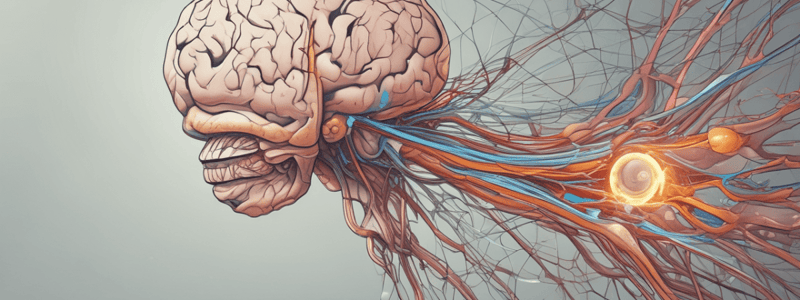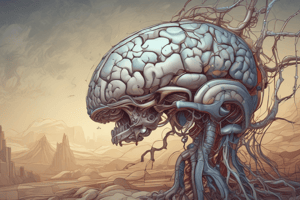Podcast
Questions and Answers
What is the purpose of the myelin sheath?
What is the purpose of the myelin sheath?
- To store nutrients for the neuron
- To enhance the speed of information transfer (correct)
- To slow down the transmission of information
- To protect the axon from damage
What is the function of the axon hillock?
What is the function of the axon hillock?
- Storing organelles
- Receiving information
- Transmitting information
- Originate action potentials (correct)
What is the main functional unit of the nervous system?
What is the main functional unit of the nervous system?
- Dendrites
- Glial cells
- Neuroglia
- Neurons (correct)
What is the term for the gaps in the myelin sheath?
What is the term for the gaps in the myelin sheath?
What is the term for the process of transmission of information between neurons?
What is the term for the process of transmission of information between neurons?
What is the function of the cell body of a neuron?
What is the function of the cell body of a neuron?
What is unique about the conduction velocity in myelinated fibers?
What is unique about the conduction velocity in myelinated fibers?
What is the function of the presynaptic terminal?
What is the function of the presynaptic terminal?
What is the term for the action potential 'jumping' from node to node?
What is the term for the action potential 'jumping' from node to node?
What type of cells are responsible for forming the myelin sheath in the CNS?
What type of cells are responsible for forming the myelin sheath in the CNS?
What is the main function of myelin in neurons?
What is the main function of myelin in neurons?
Which type of neuron has a single stem process that bifurcates to form two processes?
Which type of neuron has a single stem process that bifurcates to form two processes?
What is the main function of sensory neurons?
What is the main function of sensory neurons?
What is the main function of astrocytes?
What is the main function of astrocytes?
What is the primary function of microglia cells?
What is the primary function of microglia cells?
What is the main function of oligodendrocytes?
What is the main function of oligodendrocytes?
What is the main function of ependymal cells?
What is the main function of ependymal cells?
What is the main function of Schwann cells?
What is the main function of Schwann cells?
What is the process of axonal degeneration distal to the lesion?
What is the process of axonal degeneration distal to the lesion?
What is the main difference between glial cells and neurons?
What is the main difference between glial cells and neurons?
Larger axons have longer internodes and slower conduction velocities
Larger axons have longer internodes and slower conduction velocities
In unmyelinated fibers, conduction is proportional to the square root of the diameter
In unmyelinated fibers, conduction is proportional to the square root of the diameter
What type of neuron is considered the most common type of neuron?
What type of neuron is considered the most common type of neuron?
This neuron has two processes: 1 axon and 1 dendrite
This neuron has two processes: 1 axon and 1 dendrite
Neurons are only classified by structure, not by function
Neurons are only classified by structure, not by function
Most sensory/afferent neurons are pseudo-unipolar
Most sensory/afferent neurons are pseudo-unipolar
These are usually multipolar or bipolar neurons
These are usually multipolar or bipolar neurons
Motor neurons and Efferent are the same neuron
Motor neurons and Efferent are the same neuron
Which of the following is NOT true about Glial cells
Which of the following is NOT true about Glial cells
Neuroglia (aka glial cells) don not produce action potential
Neuroglia (aka glial cells) don not produce action potential
Regarding glial cell location in the CNS, which of the following glial cells is NOT located in the CNS
Regarding glial cell location in the CNS, which of the following glial cells is NOT located in the CNS
Which of the following neuronal cells act as macrophages?
Which of the following neuronal cells act as macrophages?
Identify this cell
Identify this cell
Identify this cell
Identify this cell
Identify this cell
Identify this cell
Identify this cell
Identify this cell
Identify this cell
Identify this cell
What type of glial cells are found in the PNS?
What type of glial cells are found in the PNS?
What cells are involved in creating cerbrospinal fluid?
What cells are involved in creating cerbrospinal fluid?
Which of the following is not a function of Astrocytes?
Which of the following is not a function of Astrocytes?
Regeneration is efficient in the CNS, not in the PNS
Regeneration is efficient in the CNS, not in the PNS
Neurons can be classified according to structure and function. What are the types of neurons?
Neurons can be classified according to structure and function. What are the types of neurons?
List the glial cells located in the CNS.
List the glial cells located in the CNS.
What are Schwann cells also called?
What are Schwann cells also called?
Flashcards are hidden until you start studying
Study Notes
The Nervous System
- The nervous system consists of two categories of cells: neurons and neuroglia.
- Neurons are the major functional units of the nervous system and are specialized in information processing.
Neuron Structure
- A neuron consists of:
- Dendrites: an information-receiving area of the cell membrane
- Cell body (soma or pericaryon): contains organelles
- Axon: an information-carrying extension of the cell membrane
- Axon hillock or trigger zone: axon origin; originates action potential
- Presynaptic terminal: end of axon; transmits information
- Myelin sheath: enhances the speed of information transfer
- Node of Ranvier: gaps in the insulating myelin sheath
Neuron Function
- Neurons communicate via synapses, specialized contact areas with other neurons, muscle fibers, or glands.
- Action potentials travel along the axon at a speed that varies from 0.5 to 120 meters per second.
- Larger axons are myelinated, while smaller ones (< 1 μm in diameter) are not.
Myelin Sheath
- The myelin sheath is a greatly modified plasma membrane wrapped around the axon in a spiral fashion.
- It originates from and is part of the Schwann cells in the PNS and oligodendrocytes in the CNS.
- The periodic interruptions are the nodes of Ranvier, critical to the functioning of myelin.
Classification of Neurons
- Neurons can be classified according to their structure:
- Multipolar neurons (most common type)
- Bipolar neurons
- Pseudo-unipolar neurons (also called unipolar)
- Neurons can also be classified according to their function:
- Sensory or afferent neurons
- Interneurons or association neurons
- Motor neurons or efferent neurons
Neuroglia or Glial Cells
- Neuroglia or glial cells are smaller than neurons and do not have axons and dendrites.
- They fill all the spaces in the nervous tissue not occupied by neurons or blood vessels.
- Glial cells are more numerous than neurons in the nervous tissue and have the capacity to divide.
- They do not produce action potentials and do not participate directly in synaptic interactions and electrical signaling.
Types of Glial Cells
- Microglial cells: the brain's immune cells, act as macrophages, and play a role in the developing brain.
- Astrocytes: star-shaped cells with numerous long-cell processes, provide structural and metabolic support for neurons.
- Oligodendrocytes: provide support to axons of neurons in the CNS, and myelinate most axons > 1 μm in diameter.
- Ependymal cells: cover the ventricles of the brain, central canal of the CNS, and choroid plexus in the 4th ventricle of the medulla oblongata.
- Schwann cells: provide support to axons of neurons in the PNS, similar to oligodendrocytes.
Wallerian Degeneration
- Axonal degeneration distal to the lesion.
- Regeneration is efficient in the PNS, not in the CNS.
- Regeneration is guided by Schwann cells.
Studying That Suits You
Use AI to generate personalized quizzes and flashcards to suit your learning preferences.




